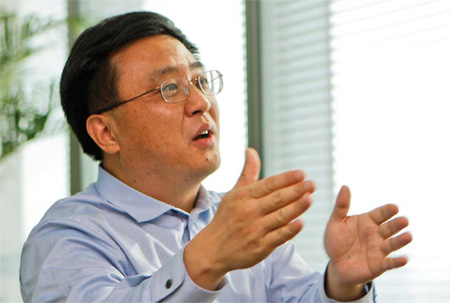Time of transformation
Updated: 2011-11-11 09:02
By Andrew Moody (China Daily)
|
|||||||||
|
Zhang Yaqin, corporate vice-president of Microsoft, says that companies need to invest more in R&D in China. Zhang Tao / China Daily |
Next microsoft, apple or google could be chinese company with current R&D efforts in china
Zhang Yaqin believes China may have to wait another generation or longer to produce the next Bill Gates or Steve Jobs.
The 45-year-old corporate vice-president of Microsoft and chairman of the software giant's Asia-Pacific R&D group, says the country's Confucian-based education system sometimes holds back original thinkers.
"To generate people like Bill Gates or Steve Jobs is going to take a while. Our education system really needs to encourage people to think out of the box, to take risks and that is not embedded in our education system," he says.
"That system is fundamentally Confucian, teaching knowledge and not creativity, producing people who are uniform and not individual."
If anyone is capable of thinking outside the box it is Zhang himself. He was famous in China long before joining Microsoft. In 1978, he was the youngest university student in the country at the age of 12, attending the University of Science and Technology of China at Hefei in Anhui province.
The former child prodigy now heads Microsoft's huge R&D efforts in China and the rest of Asia from the company's futuristic new offices in Beijing's Zhongguancun high-tech district.
The company announced in July it was adding 750 more staff to its research operations in China. It already has 3,000 core staff engaged in R&D and 7,000 external to the company working on a contract basis. Other research facilities throughout Asia, including those in Japan and South Korea, report to Beijing.
Zhang, who has a relaxed charm and is far from the geek one might expect from someone with such a formidable scientific background, insists the work in China is not isolated or Sino-centric.
"This is really the integration of some of the brightest minds in the world. We have over 300 people from the US and Europe. So this is not exactly a local R&D center."
Microsoft in China has had some notable successes. Some of the technology for Kinect, the new device that deploys voice, gesture and facial recognition and is used in the Xbox console, was developed in China.
"Ninety percent of what we do here is for global products with 5 or 10 percent for local products. Actually, I hope we can do more for China. When I drafted the entire plan (for the China center) six years ago to Bill Gates and Steve Ballmer (Microsoft's chief executive), the aim was to eventually move to 50 percent product development for China and emerging markets but so far we are a little behind that."
Zhang is keen to drive up standards and believes his staff has the potential to deliver more, particularly in terms of developing products specifically for the China market.
"We need to invest more to meet local market needs and we haven't done that. We are behind on this. And this is something that internally I have been very critical about. What we have is products for China but we don't have specific products just created for the Chinese market," he says.
Zhang admits one of the problems of operating an R&D base in China is intellectual property protection.
"It is certainly an issue for our products. There is a lot of piracy of our product. We have not had a single incidence, however, of someone stealing our code and starting another company to compete with us," he says.
He adds it would be difficult to do because Microsoft's technology is advanced and that there are so many individual technologies and components that go in a product like Windows.
"If you took a single piece of it, it would be very difficult to do anything with. We also work in an environment that is fast changing and so if someone did attempt to reproduce something, the technology is likely to have moved on," he says.
He believes the government needs to take extra measures to improve IPR protection for everyone. "The law is not bad. It is the enforcement that is bad. If you read the law, you think: 'wow'! If you take something you will be put in prison for seven years. In reality, it is not like that."
Zhang, who was brought up by his mother after his father died when he was five after being sent to a labor camp during the "cultural revolution" (1966-76), went on to do his PhD at George Washington University after graduating at 17 in China.
He spent his early career in telecommunications research in the US, where he has filed no fewer than 50 patents.
He joined Microsoft in China in 1999 and has held a number of senior positions, returning to the US for two years as head of the company's mobile and embedded division in Redmond, Washington.
He says China has had a lot of catching up to do in the field of computers compared to the West.
"From 1949 to 1979, China was closed to the outside world and it was not even a participant, just isolated. This just happened to be the first 30 years of the mainframe and the mini frame. China was not even there. The next 30 years after that China began to build and buy computers. Over the last decade China has been a participant but not a leader in PCs," he says.
Zhang says one of the weaknesses is the lack of a strong research base at Chinese universities.
"In the computing field all the state of the art research comes from the US, where the leading researchers and professors are," he says.
"If you look at the Turing Award (the most prestigious in computer science), China has only one winner, Andrew Yao at Tsinghua University and he was a professor at Princeton."
He says this reflects in the fact that those joining Microsoft at PhD level from Chinese universities need a two-year internal program to bring them up to the same level as their American equivalents.
"The problem is that they were not taught how to do research. They are really smart, however, and after that two years, they are as good and even better than some of their counterparts from the US," he adds.
Zhang, who has published 500 referred papers and a number of books including Reflections in the Time of Transformation, which looks back on his life and work, says he misses doing some of the more scientific work himself now he is heavily engaged in senior management.
"I still write code some of the time to make sure I am not so rusty. I spent two weeks to learn how to write code for cloud computing and made it work, although I don't think anyone is using it," he jokingly says.
Zhang says the primary purpose of R&D for a company like Microsoft is to maintain its leading position.
"In IT there is no guarantee, Microsoft is going to lead or even exist in the next five years. That is the purpose of research, in particular. Research is always looking at the next five- or 10-year horizon," he says.
With the amount of R&D currently going on in China, Zhang believes the next Microsoft, Apple or Google could be a Chinese company.
"People already use (Chinese) Lenovo computers around the world. I think within 30 years one of the big global names could be from China and even started by someone who used to work at Microsoft here. A number of our former colleagues are already in senior positions with Chinese companies," he says.












